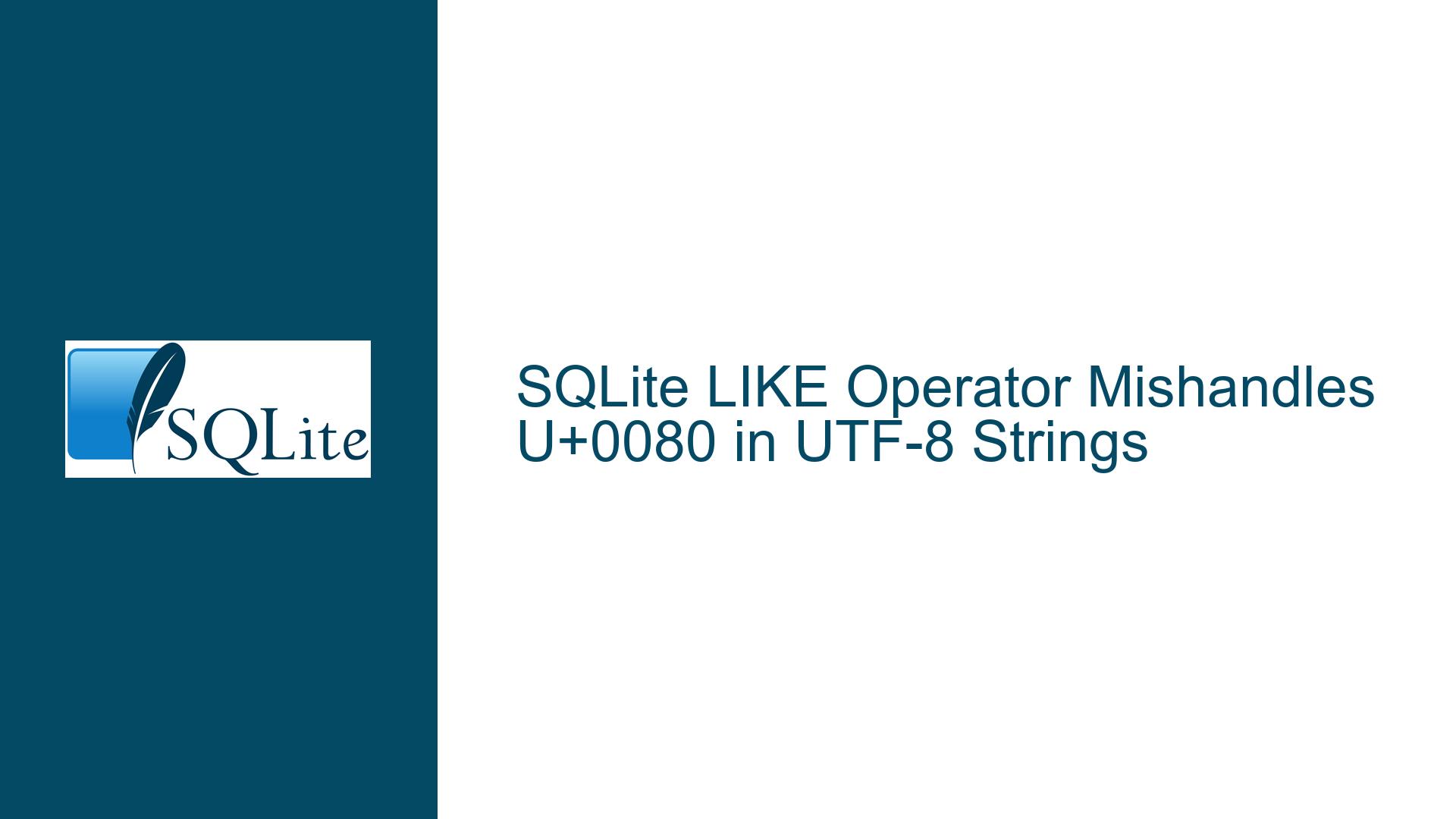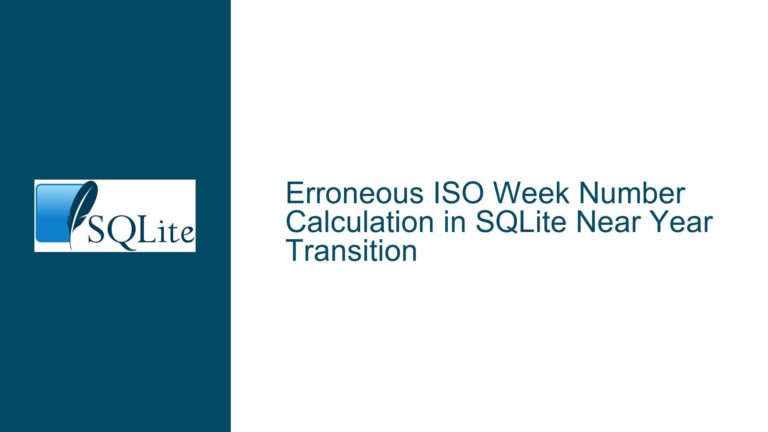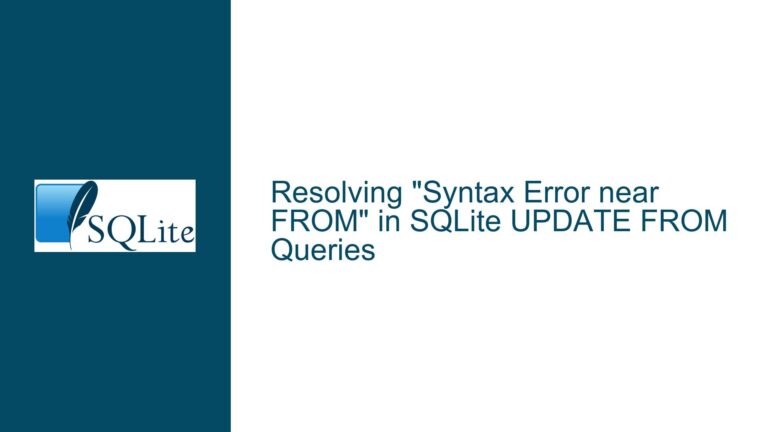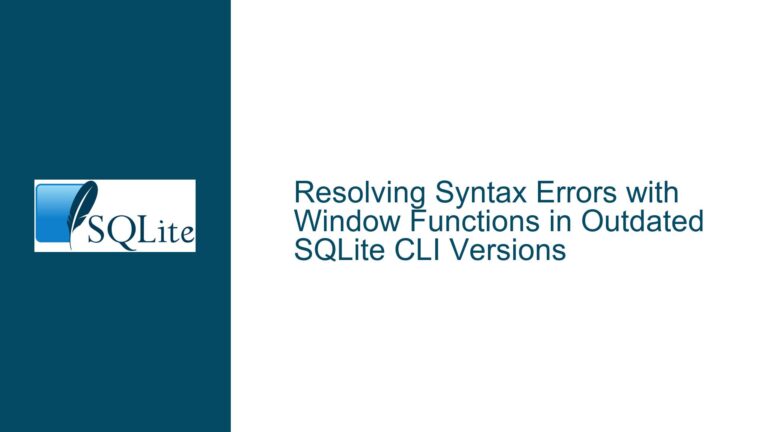SQLite LIKE Operator Mishandles U+0080 in UTF-8 Strings
Issue Overview: LIKE Operator Fails to Correctly Handle U+0080 in UTF-8 Encoded Strings
The core issue revolves around the SQLite LIKE operator’s inability to correctly handle the Unicode character U+0080 when processing UTF-8 encoded strings. Specifically, the LIKE operator, implemented in the patternCompare function within SQLite’s func.c file, incorrectly interprets the byte sequence \xc2\x80 (which represents U+0080 in UTF-8) as a single byte \x80. This misinterpretation leads to erroneous matches when the LIKE operator is used with patterns containing % followed by \xc2\x80.
The problem manifests when a query attempts to match a string containing multi-byte UTF-8 characters. For example, the query select cast(X'aa80' as text) like ('%' || cast(X'c280' as text)); incorrectly returns 1 (true) instead of the expected 0 (false). This occurs because the patternCompare function, after decoding \xc2\x80 to U+0080, mistakenly treats U+0080 as a single-byte character. Consequently, it searches for the byte \x80 in the target string, leading to a false positive match when any multi-byte character ending with \x80 is encountered.
This bug is particularly problematic in scenarios where precise string matching is required, such as in applications dealing with multilingual text or when processing user-generated content with special characters. The incorrect handling of U+0080 can lead to data integrity issues, incorrect search results, and unexpected behavior in applications relying on SQLite for text processing.
Possible Causes: Misinterpretation of UTF-8 Encoding in patternCompare Function
The root cause of this issue lies in the patternCompare function’s handling of UTF-8 encoded characters, specifically those outside the ASCII range (i.e., characters with Unicode code points greater than U+007F). The function’s logic for determining whether a character is a single-byte or multi-byte sequence is flawed, leading to incorrect pattern matching behavior.
In UTF-8 encoding, characters with code points between U+0080 and U+07FF are represented using two bytes. The first byte starts with the bit pattern 110, and the second byte starts with 10. For example, the character U+0080 is encoded as \xc2\x80. However, the patternCompare function incorrectly assumes that any character with a code point less than or equal to 0x80 (128 in decimal) is a single-byte character. This assumption is incorrect for UTF-8, as characters with code points between U+0080 and U+07FF are two-byte sequences.
The flawed logic in the patternCompare function is evident in the following code snippet:
if( c<=0x80 ){
char zStop[3];
int bMatch;
if( noCase ){
Here, the condition c<=0x80 is used to determine whether the character c is a single-byte character. However, this condition is too permissive, as it includes characters like U+0080, which are actually two-byte sequences in UTF-8. As a result, the function incorrectly treats U+0080 as a single-byte character, leading to the erroneous behavior observed in the LIKE operator.
This misinterpretation of UTF-8 encoding is the primary cause of the issue. The function’s logic needs to be adjusted to correctly identify single-byte and multi-byte characters in UTF-8 encoded strings. Specifically, the condition c<=0x80 should be changed to c<0x80 to exclude characters with code points between U+0080 and U+07FF, which are two-byte sequences in UTF-8.
Troubleshooting Steps, Solutions & Fixes: Correcting UTF-8 Handling in patternCompare
To resolve the issue, the patternCompare function must be modified to correctly handle UTF-8 encoded characters, particularly those with code points between U+0080 and U+07FF. The following steps outline the necessary changes and their implications:
Modify the Character Encoding Check in
patternCompare: The primary fix involves changing the conditionc<=0x80toc<0x80in thepatternComparefunction. This change ensures that characters with code points between U+0080 and U+07FF are correctly identified as two-byte sequences in UTF-8. The modified code snippet is as follows:if( c<0x80 ){ char zStop[3]; int bMatch; if( noCase ){This change prevents the function from incorrectly treating U+0080 as a single-byte character, thereby avoiding the erroneous matches observed in the
LIKEoperator.Test the Modified Function: After applying the fix, it is essential to thoroughly test the
patternComparefunction to ensure that it correctly handles all UTF-8 encoded characters, including those with code points between U+0080 and U+07FF. The following test cases should be considered:- Test Case 1: Verify that the query
select cast(X'aa80' as text) like ('%' || cast(X'c280' as text));returns0(false) after the fix. - Test Case 2: Test the function with various UTF-8 encoded strings containing characters with code points between U+0080 and U+07FF to ensure correct pattern matching behavior.
- Test Case 3: Test the function with mixed ASCII and non-ASCII strings to verify that the fix does not introduce regressions in the handling of single-byte characters.
- Test Case 1: Verify that the query
Review and Validate the Patch: The proposed patch, which modifies the
patternComparefunction, should be reviewed and validated by the SQLite development team. The patch has already been applied in the SQLite source repository, as indicated by the commit referenced in the discussion. However, it is crucial to ensure that the fix is included in future releases of SQLite and that it does not introduce any unintended side effects.Update Documentation: The SQLite documentation should be updated to reflect the corrected behavior of the
LIKEoperator when handling UTF-8 encoded strings. This includes providing clear examples and guidelines for using theLIKEoperator with non-ASCII characters, as well as highlighting any potential pitfalls or limitations.Communicate the Fix to Users: Users of SQLite should be informed about the fix and its implications, particularly if they are working with multilingual text or user-generated content. This communication can be done through release notes, mailing lists, or other appropriate channels.
Monitor for Regression: After the fix is deployed, it is important to monitor for any regressions or new issues that may arise as a result of the changes to the
patternComparefunction. This includes collecting feedback from users and addressing any reported problems promptly.
By following these steps, the issue with the LIKE operator’s handling of U+0080 in UTF-8 encoded strings can be effectively resolved, ensuring accurate and reliable pattern matching in SQLite. The fix not only addresses the immediate problem but also strengthens the overall robustness of SQLite’s text processing capabilities, particularly in multilingual and internationalized environments.






